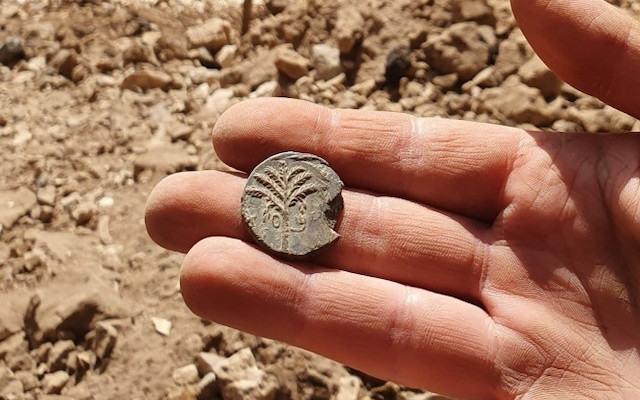Roman soldiers took with them coins minted by Jewish rebels in the Land of Israel, about 2,000 years ago, to a military camp that is now in the territory of the country of Georgia; this is according to a new study whose findings were published in the Polish journal “Notae Numismaticae.”
The archaeologists who took part in the research discovered the coins from the Roman period in Colchis, the Latin name of the earliest Georgian entity, which existed on the Black Sea shores in today's Georgia near the modern city of Batumi. Some of the coins were brought to the site by the Tenth Legion Partensis, a Roman legion established by Octavian in 41 BC, during the Roman Civil War and participated in fighting Jewish rebels during the Great Revolt in Judea.
1st-century coins from Jewish revolt against the Romans discovered near the Black Sea By Owen Jarus published 1 day ago Roman soldiers took coins minted by Jewish rebels in the Holy Land with them to a military camp in Georgia. https://t.co/HcjKXU8vsa
— Larry G (@LarryGr38843415) June 22, 2023
The first Jewish rebellion against the Romans began around 66 AD, with the peak of the fighting coming in 70 AD, with the conquest of Jerusalem and the destruction of the Second Temple by Titus. The rebellion continued until the Roman siege of Masada, which ended with the suicide of almost 1,000 Jewish defenders of Masada on Passover of 73 or 74 AD, to avoid enslavement or death at the hands of the Romans. "Most of the coins examined in the study were discovered between 2014 and 2022 by a Polish-Georgian team from the Gonio Citadel, a Roman fortress in Adjara, Georgia, on the Black Sea coast, south of the city of Batumi," Dr. Piotr Jaworski, an archaeologist and coin expert from the University of Warsaw, who took part in the research, told the magazine “Live Science.”
Dr. Jaworski and his colleagues discovered that Jewish rebels minted some of the coins and that the Romans continued to use them, after during the rebellion the Jewish rebels minted their coins, on which, among other things, Jewish symbols and trophies appeared.
The legion brought the coins to the site in Georgia around 115 AD when the Roman Emperor Trajan launched an initially successful invasion of the Parthian Empire, the ruling power in the region where Iran is now located; this action expanded the borders of the Roman Empire deep into the Eastern Mediterranean areas.
Roman coins minted to commemorate the defeat of Judea and destruction of Jerusalem. Approximately 60,000 Jewish slaves built the Colosseum in Rome which was funded by the war spoils stolen from the sacked Second Temple after the Great Jewish Revolt in 70 CE. pic.twitter.com/YYniusWPpq
— Joshua Robbin Marks (@JoshMarks78) July 2, 2019
Historical records and archaeological remains indicate that the 10th Legion Partensis took an active part in this invasion and spent some time in Colchis. "The site was a good logistical base for military operations in the area," said Dr. Jaworski.


